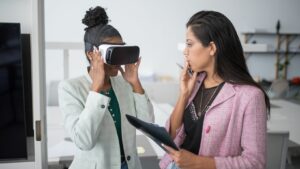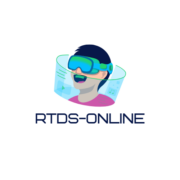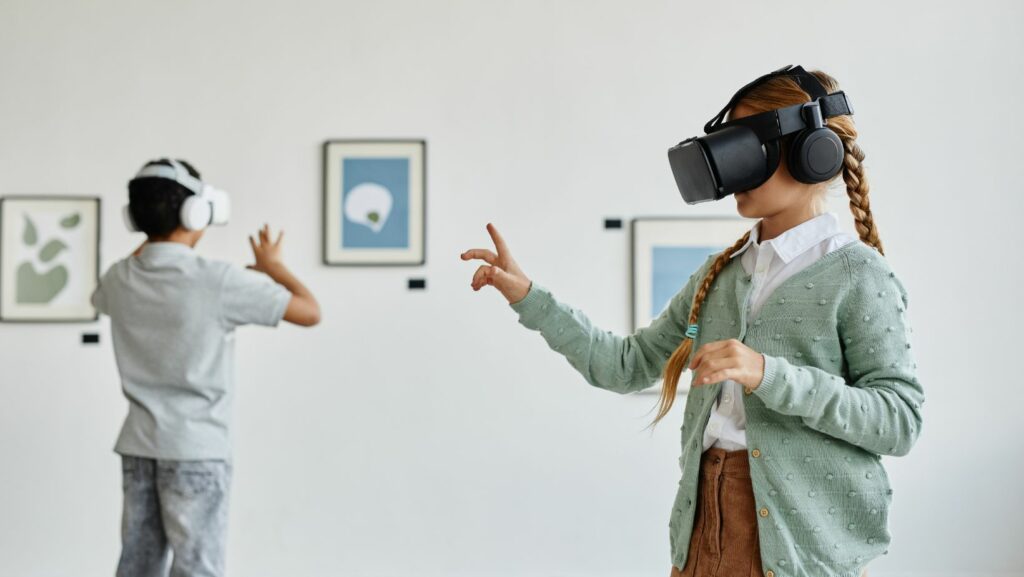Dive into the future of education with immersive learning experiences in virtual reality (VR). This cutting-edge technology isn’t just for gamers anymore; it’s reshaping how we learn, engage, and interact with information.
Imagine understanding complex concepts with the ease of a virtual walkthrough, or mastering new skills in a risk-free, immersive environment. That’s the power of VR in education.
Immersive Learning Experiences in VR
Defining Virtual Reality in Education
 To define VR in the context of education, one must grasp its potential to revolutionize learning experiences. VR in education refers to the utilization of 3D graphics and immersive experiences to aid in the interpretation and understanding of complex subject matter. For instance, instead of reading about the solar system, students can use VR to take a virtual tour of it, witnessing the planets’ associations firsthand, ensuring a more profound and lasting comprehension.
To define VR in the context of education, one must grasp its potential to revolutionize learning experiences. VR in education refers to the utilization of 3D graphics and immersive experiences to aid in the interpretation and understanding of complex subject matter. For instance, instead of reading about the solar system, students can use VR to take a virtual tour of it, witnessing the planets’ associations firsthand, ensuring a more profound and lasting comprehension.
The Evolution of VR Technology for Learning
The development of VR technology for learning showcases an impressive pathway. Starting from merely conceptual usage, VR now possesses the ability to transform abstract ideas into tangible, immersive experiences. The rise in availability and the decline in costs of VR devices like Oculus Rift, Samsung Gear VR, and others, has augmented its penetration into schools, colleges, and even workplaces. It’s bringing monumental changes in the way learning is perceived and imparted, transforming not only educational institutions but also corporate training modules. VR applications in healthcare, aviation, and engineering, to name a few sectors, demonstrate the transformative power of this technology as a learning tool. For example, in medicine, VR allows aspiring doctors to perform surgeries in a risk-free, controlled virtual environment, enhancing their skills and confidence without the potential implications of a misstep.
Key Benefits of VR in Education
Enhanced Engagement and Retention
 One of the substantial advantages of VR in education lies in its ability to stimulate both student engagement and knowledge retention. Through the use of high-quality 3D visuals and interactive experiences, VR significantly intensifies the learner’s immersion in the subject matter, catapulting their interest and concentration to unprecedented levels. In fact, research by the University of Maryland indicated that VR learners achieved a recall rate of 90%, a testament to VR’s impressive impact on memory retention. To illustrate, history teachers can take students on a time voyage to ancient civilizations, allowing them to fully engage with the era, its architecture, and culture, thereby enhancing understanding and retention of the subject matter.
One of the substantial advantages of VR in education lies in its ability to stimulate both student engagement and knowledge retention. Through the use of high-quality 3D visuals and interactive experiences, VR significantly intensifies the learner’s immersion in the subject matter, catapulting their interest and concentration to unprecedented levels. In fact, research by the University of Maryland indicated that VR learners achieved a recall rate of 90%, a testament to VR’s impressive impact on memory retention. To illustrate, history teachers can take students on a time voyage to ancient civilizations, allowing them to fully engage with the era, its architecture, and culture, thereby enhancing understanding and retention of the subject matter.
Safe Environment for Experiential Learning
Equally noteworthy is VR’s ability to create a secure platform for experiential learning. With VR, learners can explore new territories, conduct experiments, or even perform surgeries without the fear of real-world consequences. Yale School of Medicine, for example, is using VR as a training tool, permitting medical students to carry out intricate procedures in a risk-free, virtual simulation. It’s not only in the medical field where VR is making waves. Those learning to drive, engineers testing new machinery, or pilots learning to navigate complex aircraft can all benefit from the safety net VR provides.
Implementing VR in Different Educational Settings
Immersive learning experiences in VR find applications in a broad spectrum of educational settings. From schools and universities to professional training environments, VR plays a vital role to reinforce learning processes.
Case Studies in Schools and Universities
 Schools and universities incorporate VR technology to enable an engaging and interactive mode of learning. For instance, Stanford University’s Virtual Human Interaction Lab uses VR to educate students about environmental issues. Similarly, the New Jersey Institute of Technology uses the technology to provide its biomedical students a real-time view of cellular interactions.
Schools and universities incorporate VR technology to enable an engaging and interactive mode of learning. For instance, Stanford University’s Virtual Human Interaction Lab uses VR to educate students about environmental issues. Similarly, the New Jersey Institute of Technology uses the technology to provide its biomedical students a real-time view of cellular interactions.
VR Training in Professional Development
Innumerable professionals benefit from VR training, as it provides experience-based learning aiding in skill development. Let’s take the airline industry, where flight simulators have been extensively used for pilot training. VR has now taken it to a new level with more realistic simulations, allowing pilots to practice emergency procedures without real-world risk.
Construction industry professionals also use VR for safety training, enabling them to identify and mitigate potential hazards in a virtual construction site.

